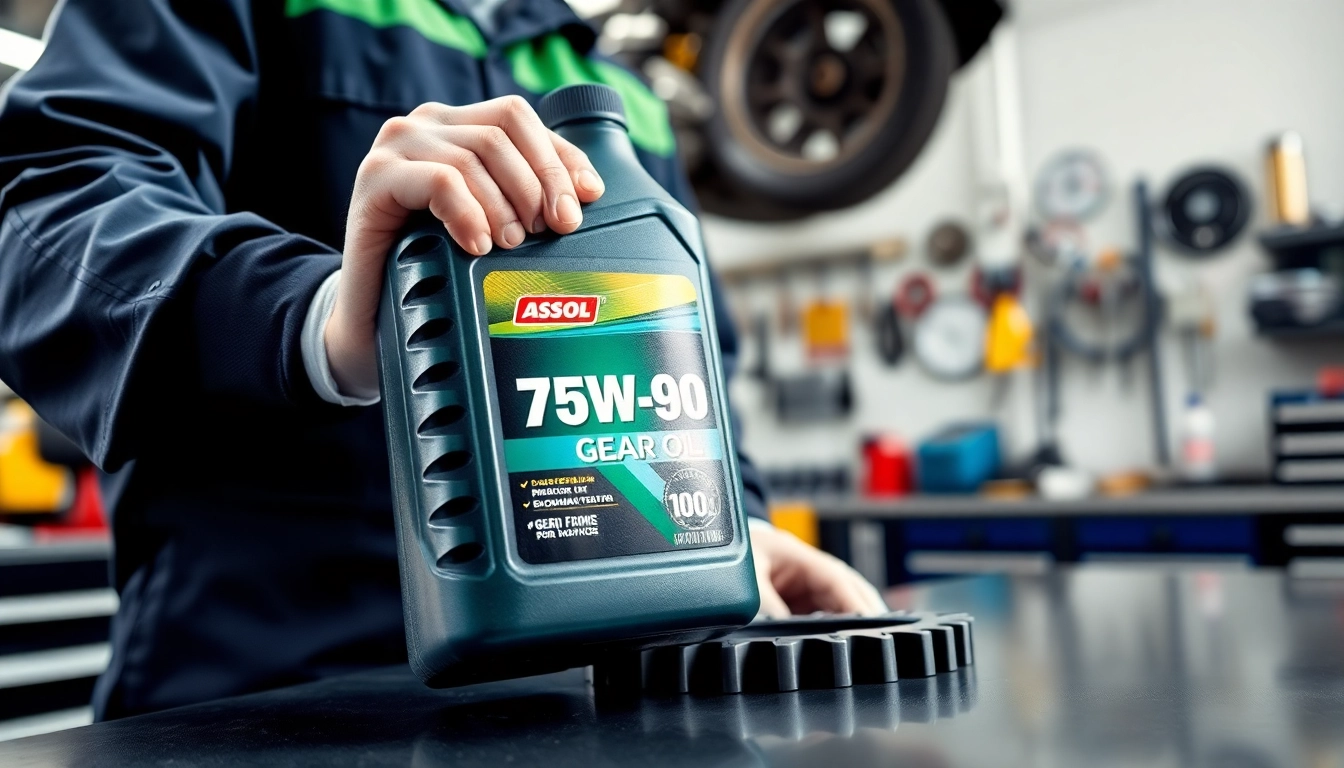Understanding Gear Oil: The Basics of 75W-90
What is Gear Oil 75W-90?
Gear oil 75W-90 is a specific type of lubricant designed primarily for manual transmissions, transfer cases, and differentials. The number ’75’ indicates the oil’s viscosity at low temperatures, while ’90’ reflects its viscosity at higher temperatures, making it suitable for a variety of driving conditions. This type of gear oil is engineered to provide superior protection against wear and tear, thereby extending the operational lifespan of your vehicle’s transmission components.
Applications of Gear Oil 75W-90
75W-90 gear oil is versatile and used in various applications, including:
- Manual Transmissions: It delivers critical lubrication that is essential for optimal shifting performance.
- Differentials: The oil works to ensure smooth engagement and disengagement of gears, preventing slippage and enhancing performance during acceleration.
- Transfer Cases: In vehicles equipped with all-wheel drive or four-wheel drive, this oil maintains gear integrity under extreme loading conditions.
Key Benefits of Using Gear Oil 75W-90
Utilizing gear oil 75W-90 comes with several notable advantages:
- Enhanced Lubrication: Reduces friction between moving parts, offering smoother operation.
- High Load Capacity: Suitable for high-power applications, ensuring the gears can handle increased stresses without breaking down.
- Resistance to Oxidation: Maintains its properties longer, helping to prolong the life of the oil and your vehicle’s components.
- Temperature Stability: Performs well across a wide range of temperatures, making it ideal for various environments and climates.
Comparative Analysis: Gear Oil 75W-90 vs. Other Viscosities
When to Choose 75W-90 Over 80W-90
The choice between 75W-90 and 80W-90 gear oils primarily hinges on the operating temperature conditions. The 75W-90 variant is thinner than 80W-90 at high temperatures, making it more suitable for colder climates. In contrast, 80W-90 gear oil may provide better protection in warmer environments due to its thicker consistency.
75W-90 vs. 75W-140: What’s the Difference?
While both 75W-90 and 75W-140 gear oils function well in various applications, the primary distinction lies in their viscosity at high temperatures. The 75W-140 is thicker and often recommended for vehicles that experience heavy loads or extreme driving conditions. As a result, 75W-90 is typically preferred for lighter vehicles or applications where high performance is necessary but legal loads are less demanding.
Choosing the Right Viscosity for Your Vehicle
Determining the correct viscosity for your vehicle depends on several factors, including:
- Manufacturer Specifications: Always consult your vehicle’s manual to ensure compatibility.
- Driving Conditions: If you drive in colder climates, 75W-90 may be beneficial for smoother operation and quicker starts.
- Type of Vehicle: Light-duty vehicles often perform just fine with 75W-90, whereas heavier duty vehicles might require thicker oils.
How to Properly Change Gear Oil 75W-90
Tools and Equipment Needed for an Oil Change
To change gear oil effectively, you’ll need several tools:
- Socket Set: For removing and securing bolts.
- Oil Drain Pan: To catch the old oil.
- Funnel: For easy pouring of the new oil.
- Ratchet Wrench: To make access easier.
- Gloves and Safety Goggles: For personal protection during the process.
Step-by-Step Guide to Changing Gear Oil
- Prepare Your Vehicle: Make sure that your vehicle is on level ground. Engage the parking brake for safety.
- Remove the Drain Plug: Place the drain pan beneath the oil pan and use your ratchet to remove the drain plug.
- Drain the Old Oil: Allow the old oil to fully drain into the pan.
- Replace the Drain Plug: Once drained, replace and secure the drain plug.
- Pour New Oil: Use a funnel to pour the new gear oil 75W-90 into the fill hole.
- Check Oil Level: After filling, check the level using the dipstick to ensure you’ve added enough oil.
- Dispose of Old Oil: Properly recycle the used oil at a local recycling center.
Common Mistakes to Avoid During Oil Changes
The process of changing gear oil can seem straightforward, but several common mistakes can compromise the effectiveness of the new oil:
- Neglecting to Check Compatibility: Always ensure the oil’s specifications match your vehicle’s needs.
- Overfilling: Adding too much oil can lead to leaks and may harm the pressure in the system.
- Forgetting to Replace the Drain Plug: Failing to reinstall the plug can result in a significant mess and damage to the gears.
Top Brands of Gear Oil 75W-90 to Consider
Comparative Review of Popular Brands
When it comes to selecting gear oil, several brands stand out due to their quality and performance:
- Mobil 1: Known for its synthetic formulations, Mobil 1 offers exceptional protection and performance under extreme conditions.
- Pennzoil: Provides high-quality oils that are well-regarded for their reliability and effectiveness, particularly in first-fill applications.
- Valvoline: Offers a range of options suitable for both conventional and synthetic needs, ensuring a broad spectrum of compatibility.
- AMSOIL: Excellent choice for those looking for synthetic gear oils that promise high-performance results even in heavy-load conditions.
User Ratings and Market Trends
Consumer ratings and reviews can provide valuable insight into which gear oils deliver the best results. Generally, synthetic oil options receive higher ratings for their extended protection and performance capabilities. Websites such as gear oil 75w90 rankings and auto forums can offer both qualitative and qualitative insights from actual users, helping potential buyers make informed choices.
Ecosystem of Eco-Friendly Gear Oils
With a growing emphasis on sustainability, eco-friendly gear oils have gained traction. These products are formulated using renewable resources and comply with stricter environmental regulations. When choosing eco-friendly options, look for products that:
- Utilize biodegradable additives
- Exceed industry standards for performance and protection
- Offer great wear protection while being less harmful to the environment
Frequently Asked Questions About Gear Oil 75W-90
What Should I Know Before Purchasing Gear Oil?
Before making a purchase, consider the following:
- Consult your vehicle’s manual for the recommended specifications.
- Compare prices and check for the best deal from multiple retailers.
- Understand the difference between synthetic and conventional oils to choose what best meets your vehicle needs.
Can I Use Gear Oil 75W-90 in Any Vehicle?
While 75W-90 gear oil is suitable for many vehicles, not all vehicles require this viscosity. Always check your owner’s manual or consult a professional mechanic to ensure you’re using the correct oil for your specific make and model.
Maintenance Tips for Gear Oil Longevity
To ensure your one keeps performing optimally, consider these maintenance tips:
- Regular Checks: Frequently check the oil level and condition. Clear signs of oxidation or granulation necessitate a change.
- Schedule Changes: Stick to recommended intervals for oil changes as outlined in your vehicle’s manual.
- Monitor Performance: Unusual noises or changes in vehicle handling may indicate a problem with the oil or its viscosity level.


